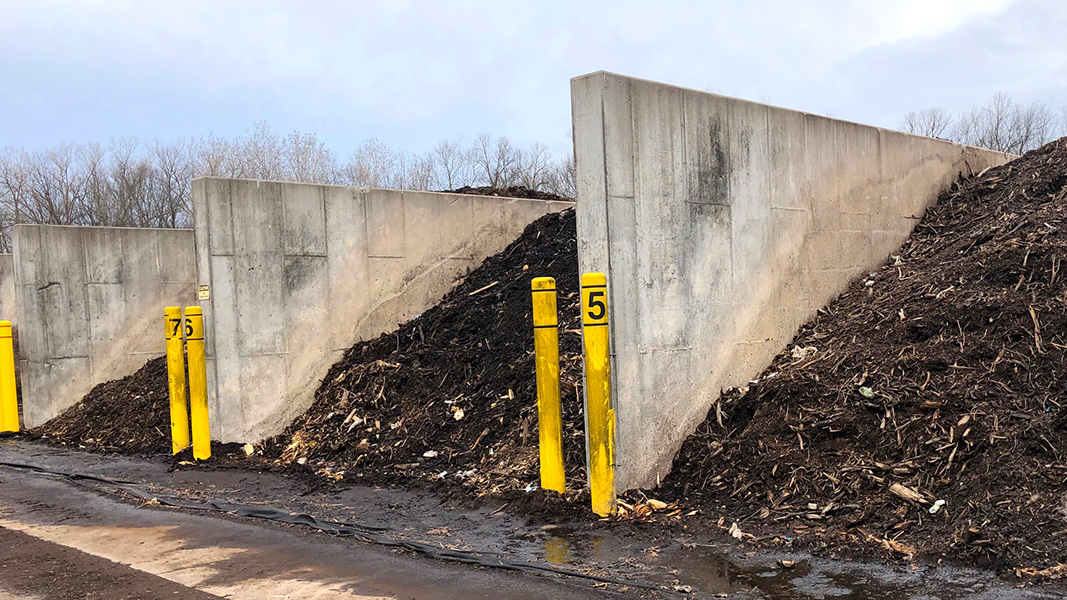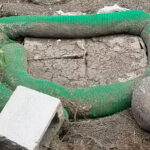Top: Compost manufacturers are vulnerable to PFAS-related liability and should be explicitly exempt from proposed Superfund update. Photo by Nora Goldstein
In May, BioCycle wrote about five bills introduced by U.S. Senator Cynthia Lummis (R-WY) to ensure industries and municipalities are not subject to liability claims if the U.S. Environmental Protection Agency (EPA) designates per- and polyfluoroalkyl substances (PFAS) compounds as hazardous substances. The exempted entities in these bills either do not contribute to PFAS contamination or are required to use PFAS-containing substances through regulations. Lummis introduced this legislation in response to an August 2022 proposed EPA rule to designate two PFAS compounds — PFOS and PFOA — as hazardous substances under the Comprehensive Environmental Response, Compensation and Liability Act (CERCLA), also known as Superfund. The proposed rule would subject any entity with PFAS contamination to potential CERCLA liability from the EPA and third parties. Composting facility operators and others in the waste and wastewater sectors consider themselves “passive receivers” of PFAS-containing material.
“If this EPA CERCLA rule were to be finalized as proposed, ‘passive receivers’ such as compost manufacturers would be held liable for PFAS contamination they are not responsible for,” explains Linda Norris-Waldt, Deputy Director of the US Composting Council (USCC) and advocacy lead. “The bills are still in the stage of seeking more cosponsors, so no further action has been taken at this point. In June, we had the opportunity to review PFAS-related draft legislation to be introduced by U.S. Senators Tom Carper (D-Del.) and Shelley Moore Capito (R-W.Va.), Chair and Ranking Member of the Senate Environment and Public Works (EPW) Committee, that seeks to improve the mitigation and remediation of PFAS contamination. The USCC asked its members in states where we are targeting Senators who can influence upcoming PFAS legislation to send letters asking for consideration for exemption from CERCLA liability related to PFAS to be added to this draft legislation. Included were Sen. Alex Padilla (CA), Sen. John Fetterman (PA), Sen. Debbie Stabenow (MI), and Sen. Mark Kelly (AZ), in addition to Carper and Moore Capito. Our members were very responsive and sent in letters. We expect this bill to be introduced after Congress’ August recess.”
The draft legislation has three primary goals: Support EPA’s ability to address PFAS for communities through infrastructure and new technologies; Expand EPA science related to PFAS; and Assist communities dealing with PFAS contamination. “In our letters to Senators, we asked them to consider the fate of composting facilities if we are included as potential liable parties for cleanup costs and to ensure that the creators and intentional users of PFAS chemicals pay the entire bill, not be offset by taxpayers, ratepayers and the general public in the ‘polluters pays’ model of Superfund,” says Norris-Waldt. “Although some have tried to assure USCC that we need not worry because U.S. EPA will use its ‘discretionary authority’ to choose not to prosecute compost manufacturers where PFAS is found near facilities or in products, it doesn’t codify it in law. That is the language we would like to see in the new EPW bill, like it is in the Loomis-sponsored bills.”
She adds that the risks to composters include:
- State Superfund “trustees” could still hold facilities liable at the state level even if EPA chooses to use its discretion around composting facilities.
- Private parties can sue facilities for cleanup.
- The uncertainty could cause difficulty for composting facility operators and infrastructure expansion as insurance and banking costs grow due to uncertainty.
“The bottom line is our industry may face a shrinkage when the U.S., healthy soils and the climate need an expansion,” emphasizes Norris-Waldt. “We are recommending that USCC members who are compost manufacturers invite their Members of Congress to tour their facilities while they are home for their August recess. One of the biggest hurdles we face is elected officials and regulators not understanding what composting facilities do, and why they are critical components to improving soil health, reducing landfill methane emissions, and providing climate resilience tools.”













